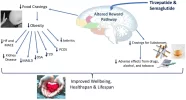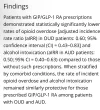I don't think so.
Just as the long term clinical trials prove there's no such thing as GLP "tolerance" ever developing, there no reason to believe the "enjoyment" of substances returns to a pre-GLP level.
The way desire for food is reduced, not just through physical "stick" means of punishment, the same things that happen when we force ourselves to eat beyond our appetite, the same effects(acid reflux, nausea) many here struggle to overcome while trying to take on more calories but physically can't without an appetite stimulant, but the psychological "carrot" portion of the effect reducing desire, then making even the thought of "more" nauseating. The "that doesn't even sound appetizing" for foods one once craved without limit.
Sure, it's possible to force oneself to consume despite the lack of appetite, But not only is the pleasure from doing so greatly diminished, eventually there's a point hit where consumption becomes increasingly unpleasant, and willpower, just like the guys struggling to eat another chicken breast, eventually gives out and you just can't do it.




